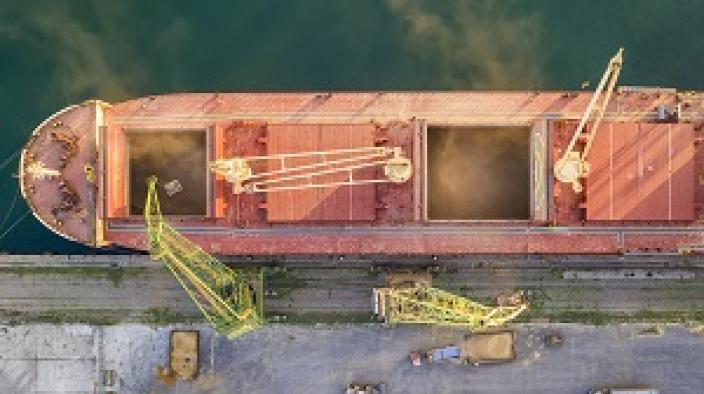
Laura Haddon
Published: November 11, 2020
The recent case of K Line Pte v Priminds Shipping (HK) Co. Ltd [2020] EWHC 2373 (Comm) (The Eternal Bliss) clarifies years of uncertainty and divided opinion over a shipowner’s right to damages in addition to demurrage where the charterer fails to load and discharge within the agreed laytime.
Background
The dispute arose in relation to the carriage of a cargo of soybeans from Brazil to China. At the discharge port, the vessel was kept at anchorage for 31 days due to port congestion and a lack of storage space ashore for the cargo. As a result of the delay, the cargo suffered significant moulding and caking and the receivers brought a claim against the Owners which the Owners subsequently settled for US$1.1 million. The Owners then commenced arbitration proceedings against the Charterers seeking damages or an indemnity in respect of that cost.
It was agreed between the parties that the following question of law be referred to the High Court (the “Court”) for determination pursuant to section 45 of the Arbitration Act 1996: Where a vessel has been delayed at the discharge port beyond the agreed laytime and such delay has caused damage to the cargo and led to the owners suffering loss and damage in respect thereof, is demurrage the owners’ exclusive remedy or are the owners entitled to recover, in addition to demurrage, damages for the charterers’ breach in failing to discharge within the agreed laytime and/or an indemnity in respect of the consequences of complying with the charterers’ orders? Is it necessary to show breach of a separate obligation in order for damages in addition to demurrage to be recoverable?
It was common ground between the parties that the only breach committed by the Charterers was the breach of its obligation to discharge within the agreed laytime.
Owners argued that where the charterer’s breach causes damage in addition to the detention of the ship, such losses can be recovered in addition to demurrage. The Charterers argued however that demurrage was the exclusive remedy for the breach.
The divided academic opinion
Support for the Charterers’ position can be found in, amongst others, Voyage Charters; the authors of that text being of the view that if damages in addition to demurrage are to be recovered, it is necessary to show not only damage of a different kind from delay in the completion of loading and discharging but also breach of a separate obligation to the obligation to load and discharge within the agreed laytime.
Support for the rival position adopted by Owners can be found in, amongst others, Scrutton on Charterparties; the authors of that text being of the view that damages are available in addition to demurrage even where there is no further breach of charterparty beyond the failure to load or discharge within the agreed laytime.
What is it that demurrage liquidates?
The Court described the main point of principle as being a question of what it is that demurrage liquidates. Does demurrage fix and therefore limit the shipowner’s recovery in respect of all loss and damage flowing from the charterer’s failure to load and discharge within the agreed laytime or only those losses arising from the shipowner’s loss of use of the vessel as a freight-earning instrument?
The Court concluded that the demurrage rate is intended to liquidate the shipowner’s loss of earnings arising from the loss of use of the ship to earn freight; it does not seek to liquidate a claim for a different type of loss, whatever the basis for such a claim.
The Court further concluded that the damage to the cargo in this case was distinct in nature from the detention of the ship, as a type of loss, and since the demurrage rate did not seek to liquidate this type of loss, it followed that it was in principle recoverable.
However, the question was whether a separate breach was required before damages for this type of loss may be recovered. In order to answer this question, the Court undertook an extensive review of the authorities and academic literature.
One breach or two required?
The Court referred to the Court of Appeal decision in Reidar v Arcos [1927] which decided by majority ratio that a demurrage clause does not defeat a claim for deadfreight for breach of the obligation to load a full cargo even where that breach itself results from the failure to load at the contractual loading rate.
While the majority in Reidar v Arcos thought that the charterers had committed two breaches of contract and the minority thought that there had been only one breach, this did not mean that Reidar v Arcos was authority for the proposition that a separate and different breach of contract is required in law before unliquidated damages may be recovered for a separate and different type of loss to the loss of use of the vessel.
Indeed, the reasoning in a later High Court decision (The Bonde [1991]) in support of the need for an additional and different breach of contract, other than the loading rate obligation, was, in The Eternal Bliss, found to have been wrongly decided. The court in The Bonde had considered (wrongly) that the effect of Reidar v Arcos was that if there had only been one breach of contract, then the shipowner’s claim for deadfreight would have failed.
The Court noted that “It is a strong thing for a judge of first instance to refuse to follow a prior decision at first instance that has stood without direct criticism in later case-law for a substantial period of time” however the Court also recognised the significance of the decision for the shipping community: “From time to time, a case provides the opportunity to resolve a long-standing uncertainty on a point of law of significance in a particular field of commerce. This is such a case.”
Commentary
The decision will be a welcome development for shipowners as it paves the way for them to recover losses which are different in nature to the loss of use of the vessel without needing to identify any separate breach of charterparty by the charterer.
The decision will not be so welcomed by voyage charterers, particularly in the current climate of Covid-19 where the delays that the pandemic is causing to vessels at ports around the world could well lead to owners suffering losses that are unrelated to the vessel’s earning potential, albeit a mitigating factor is that recovery of those other losses will still be dependent on satisfying the usual tests of causation and remoteness.
The Charterers in The Eternal Bliss have recently obtained permission to appeal the decision by the High Court and therefore whether or not the decision will really end 100 years of uncertainty and become settled law remains to be seen.
On 18 November 2021, the Court of Appeal reversed the judgment of the High Court, holding that demurrage is a shipowner’s sole remedy for a charterer’s breach in failing to complete cargo operations within the agreed laytime and that if damages in addition to demurrage are to be recovered, the shipowner must prove a separate breach of charterparty. An article on the Court of Appeal judgment is at The Eternal Bliss - Demurrage; what does it liquidate?.



